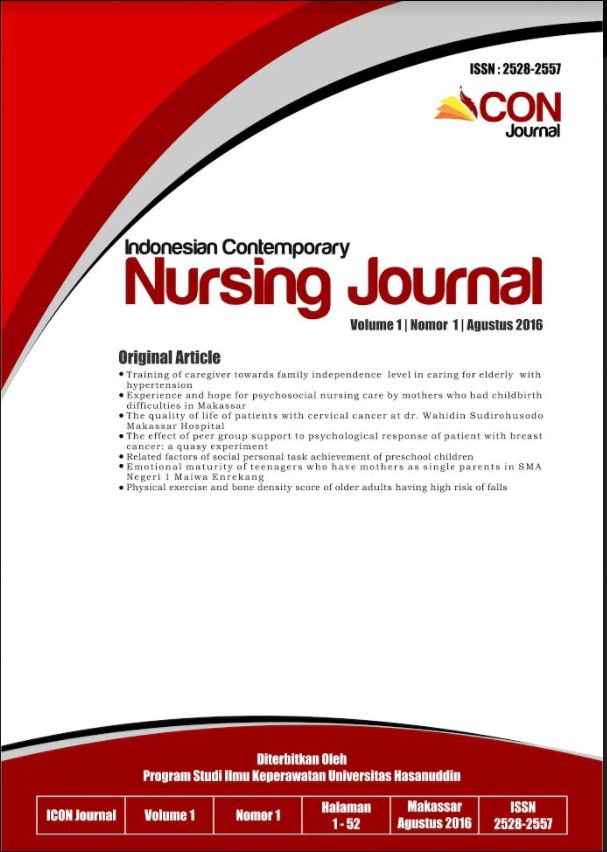Does Self-Stigma Affect Self-Efficacy on Treatment Compliance of Tuberculosis Clients?
DOI:
https://doi.org/10.20956/icon.v5i1.9645Keywords:
Self-Efficacy, Self-Stigma, Treatment Compliance, TuberculosisAbstract
Introduction. TB is a contagious infectious disease that still threatens globally. One of the problems in TB control management is related to the issue of low treatment compliance. Low adherence to medication can be influenced by psychological factors, one of which is self-stigma. Method. This study aims to describe the self-stigma of TB clients and their relationship with self-efficacy in TB treatment compliance. This study used a cross-sectional method. The total sample was 157 people taken by purposive sampling technique at 18 community health centers (Puskesmas) in Jeneponto Regency. Data collection techniques used self-stigma and self-efficacy of TB treatment compliance questionnaires which were given directly to respondents. Then, the researcher used univariate and bivariate analysis in analyzing data. Result. The result of this study shows that 52.4% of respondents with high self-stigma had low self-efficacy of medication adherence. Among respondents with low self-stigma, 23.3% of respondents indicated low self-efficacy of treatment compliance. It means that there is a correlation between self-stigma and self-efficacy of treatmen compliance with p-value 0.001 * (<0.05). TB adult clients who have high self-stigma are 3 times more likely to have low self-efficacy of treatment compliance than TB adult clients who have low self-stigma. Conclusion. The results of this study indicate the need to consider self-stigma factors for TB clients in TB control management regimens, especially in providing informational and emotional support to increase self-efficacy in TB treatment compliance.
References
Bandura, Albert (1997). Self efficacy, The exercise of control. W.H Freeman and company. New York
BPK RI. (2015). Penetapan Daerah Tertinggal Tahun 2015-2019. Diakses dari https://peraturan.bpk.go.id/Home/Details/41885/perpres-no-131-tahun-2015
Chambers, J. A., O’Carroll, R. E., Hamilton, B., Whittaker, J., Johnston, M., Sudlow, C., & Dennis, M. (2011). Adherence to medication in stroke survivors: A qualitative comparison of low and high adherers. British Journal of Health Psychology, 16(3), 592–609. Diakses dari https://doi.org/10.1348/2044-8287.002000
Choowong, J., Tillgren, P., & Söderbäck, M. (2017). Thai people living with tuberculosis and how they adhere to treatment: A grounded theory study. Nursing and Health Sciences, 19(4), 436–443. Diakses dari https://doi.org/10.1111/nhs.12362
Corrigan, P. W., & Watson, A. C. (2002). Understanding the impact of stigma on people with mental illness. World Psychiatry, 16–20. Diakses dari https://www.ncbi.nlm.nih.gov/pmc/articles/PMC1489832/
Cremers, A. L., De Laat, M. M., Kapata, N., Gerrets, R., Klipstein-Grobusch, K., & Grobusch, M. P. (2015). Assessing the Consequences of Stigma for Tuberculosis Patients in Urban Zambia. PLoS ONE, 10(3), 1–16. Diakses dari https://doi.org/10.1371/journal.pone.0119861
Hirsch-Moverman, Y., Daftary, A., Franks, J., & Colson, P. W. (2008). Adherence to treatment for latent tuberculosis infection: systematic review of studies in the US and Canada. The international journal of tuberculosis and lung disease : the official journal of the International Union against Tuberculosis and Lung Disease, 12(11), 1235–1254.
Kamaradova, D., Latalova, K., Prasko, J., Kubinek, R., Vrbova, K., Mainerova, B., Tichackova, A. (2016). Connection between self-stigma, adherence to treatment, and discontinuation of medication. Patient Preference and Adherence, 10, 1289–1298. Diakses dari https://doi.org/10.2147/PPA.S99136
Kemenkes RI. (2018). Riset Kesehatan Dasar (RISKESDAS) 2018. Diakses dari https://www.kemkes.go.id/resources/download/info-terkini/hasil-riskesdas-2018.pdf
Lyimo, R. A., Stutterheim, S. E., Hospers, H. J., de Glee, T., van der Ven, A., & de Bruin, M. (2014). Stigma, Disclosure, Coping, and Medication Adherence Among People Living with HIV/AIDS in Northern Tanzania. AIDS Patient Care and STDs, 28(2), 98–105. Diakses dari https://doi.org/10.1089/apc.2013.0306
Moya, E. M., & Lusk, M. W. (2013). Estigma y percepciones de la tuberculosis en la frontera mexicano-estadounidense. Salud Pública de México, 55(1), s498–s507. Diakses dari https://www.scielosp.org/article/spm/2013.v55suppl4/s498-s507/
Pender, N.J., Murdaugh,C. L. & Parsons, M.A. (2015). Health Promotion in Nursing Practice, 7th Edition. Pearson. United State of America.
Pratiwi, N. L., & Roosihermiatie, B. (2012). Faktor determinan budaya kesehatan dalam penularan penyakit TB Paru. Buletin Penelitian Sistem Kesehatan, 15 No.1, 26–37. Diakses dari
http://ejournal.litbang.depkes.go.id/index.php/hsr/article/view/2974.
Rondags, A., Himawan, A. B. ud., Metsemakers, J. F. m., & Kristina, T. N. u. (2014). Factors influencing non-adherence to tuberculosis treatment in Jepara, central Java, Indonesia. The Southeast Asian Journal of Tropical Medicine and Public Health, 45(4), 859–868. Diakses dar https://pubmed.ncbi.nlm.nih.gov/18926033/
Sabila, N. T. (2018). Gambaran Kebutuhan Dukungan Keluarga Klien Tuberkulosis. (Skripsi). Universitas Indonesia
Sari, Y. (2016). Pengaruh Coaching Terhadap Self-stigma/Self-stigma dan Kualitas Hidup Klien Tuberkulosis. (Tesis) Universitas Indonesia.
Solikhah, M. (2017). Hubungan Dukungan Keluarga dengan Efikasi Diri Klien Tuberkulosis Paru di Wilayah Kerja, Puskesmas Kecamatan Jagakarsa Jakarta Selatan. (Tesis). Universitas Indonesia.
Uhlmann, C., Kaehler, J., Harris, M. S. H., Unser, J., Arolt, V., & Lencer, R. (2014). Negative impact of self-stigmatization on attitude toward medication adherence in patients with psychosis. Journal of Psychiatric Practice, 20(5), 405–410. https://doi.org/10.1097/01.pra.0000454787.75106.ae
WHO. (2017). Global Tuberculosis Report 2017. WHO. Diakses dari https://www.who.int/tb/publications/global_report/gtbr2017_main_text.pdf?ua=1
Downloads
Published
How to Cite
Issue
Section
License
Authors who publish with this journal agree to the following terms:Authors retain copyright and grant the journal right of first publication with the work simultaneously licensed under a Creative Commons Attribution License that allows others to share the work with an acknowledgement of the work's authorship and initial publication in this journal.
Authors are able to enter into separate, additional contractual arrangements for the non-exclusive distribution of the journal's published version of the work (e.g., post it to an institutional repository or publish it in a book), with an acknowledgement of its initial publication in this journal.
Authors are permitted and encouraged to post their work online (e.g., in institutional repositories or on their website) prior to and during the submission process, as it can lead to productive exchanges, as well as earlier and greater citation of published work (See The Effect of Open Access).
Accepted 2020-08-27
Published 2020-08-31



